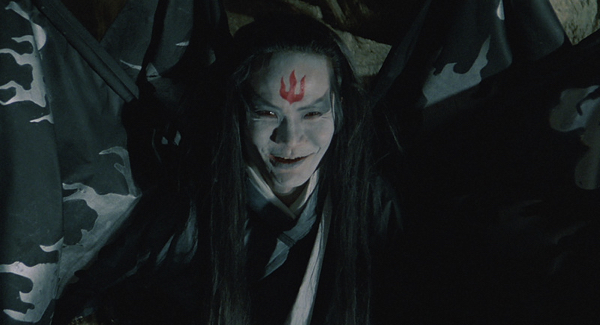
Dir.: Massaki Kobayashi; Cast: Michiyo Aratama, Misako Watanabe, Renaro Mikuni, Tatsuya Nakadai, Keiko Kishi, Katsuo Nakamura, Tetsuo Tanba, Takashi Shimura, Hanuko Sugimura, Osamu Takizawa, Ganjiro Nakamura, Noburo Nakaya; Japan 1964, 183 min.
Japanese director Massaki Kobayashi (1916-1996), best known for his Human Condition trilogy, adapted writer Yoko Mizuki’s script based on four short stories by Lafkadio Hearn, into a sumptuous, eerie and beguiling horror feature, with the images of DoP Yoshio Miyajima of carrying the sometimes rather slim narrative. To use the term horror is perhaps a little misleading since the storyline often focuses on supernatural forces invading the human sphere and re-creating a balance, which was disturbed by the protagonists. The quartet are more or less fairy-stories, all told with a didactic undertone.
In The Black Hair (Kurokami), a poor Samurai (Mikuni) leaves his loving wife (Aratama) because he can not stand the poverty any more. He marries the daughter of a wealthy family (Watanabe), but soon tires of her, telling the lday-in-waiting he had only married for her inheritance, sending her back to the family in shame. After years of wandering around, the Samurai returns to his first wife’s house, finding it in disrepair. She surprisingly takes him back and, before falling asleep, the re-united couple make plans for a happy future. When the warrior wakes up next morning he discovers, he has slept next to her rotting corpse and tries to run away in horror, but the titular hair of his wife keeps him back.
The Snow Maiden (Yukionna) is the tale of two woodcutters who seek refuge from the cold in a fisherman’s hut. One of them, Mosaku is killed by a Yuki-Onna (Keiko Kishi), a ghost-like creature. When it is Minokishi’s (Tatsuya Nakadai) turn, the spirit spares him because he is so handsome. But she tells him never to share her secret. Minokoshi returns home, and obeys her. One day she meets a beautiful woman, called Yuki, another incarnation of the Yuki-Onna. When she stitches a kimono at night, he sees the resemblance and tells her. Yuki forgives him for breaking his word because of their two children, but leaves him behind, heartbroken.
In Hoichi the Earless (Miminashi Hoichi no Hanashi), a blind musician/monk, Hoichi (Nakamura) is an accomplished biwa player. He is singing about the battle between two clans at the height of the Genpei War. One night a Samurai (Taba) visits him in the garden, asking him to play for his master, the Warlord. The High Priest of the monastery (Shimura) finds out about Hoichi’s nightly adventures, and tells him he is in great danger. The monks paint the text of the war ballad all over Hoichi’s body, but forget the ears. This has dire consequences for Hoichi, but there is still a happy-end waiting for him.
The last episode, In a Cup of Tea (Chawan no naka) is rather tame in comparison with the previous trio. A writer (Takizawa), who is also the narrator, hears the story about the attendant Sekinai, who sees the face of un unknown man in a cup of water. Even though he refills the cup many times, the face will not go away. Later on, the person’s face comes alive, calling himself Shikibu (Nakaya). He brings two friends with him, the trio trying to kill Sekinai. The writer leaves the end of the story open, leaving the solution to the imagination of the readers.
Kwaidan went on to win the Special Jury Price at the Cannes Festival in 1964. Today it is mainly considered a masterpiece due to Miyajima’s masterly photography. The whole set was located in a huge aircraft hangar, with the hand-painted sets reflecting the changing seasons and settings. Kwaidan needs to be watched, not seen or interpreted. It has all the qualities of a Grimm fairy-tales, coupled with a specific Japanese form of angst and fatalism. AS
NOW ON BLURAY COURTESY OF MASTERS OF CINEMA | 27 APRIL 2020